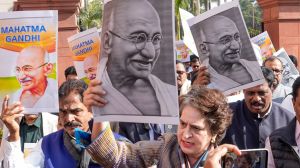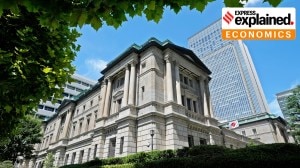Kerala High Court on Monday (February 19) upheld the life imprisonment awarded to 10 persons, including three leaders of the CPI(M), in the sensational T P Chandrasekharan murder case from 12 years ago.
While the HC confirmed the life sentences given by the trial court to these accused, it quashed the acquittals of two other CPM leaders by the trial court. Their punishments will be declared later.

What was the T P Chandrasekharan murder, one of the most sensational in Kerala, and considered a watershed in the long and bloody history of political violence in the state?
What happened on May 4, 2012?
An SUV hit the two-wheeler that Chandrasekharan was riding in Vallikkad in Kozhikode district. As Chandrasekharan fell to the ground, a gang of assailants jumped out of the vehicle and hacked him to death. Chandrasekharan’s body bore 51 deep wounds.
Apparently to create an atmosphere of terror and to prevent people from approaching the scene, the killers exploded bombs before fleeing. To mislead investigators, they had pasted a sticker on the SUV that said “Masha Allah” (What God has willed, has happened).
Who was T P Chandrasekharan?
Chandrasekharan, who was 51 when he was murdered, was a prominent leader of the Revolutionary Marxist Party (RMP) in the CPM citadel of Onchiyam near Vatakara in Kozhikode. Chandrasekharan was himself with the CPM earlier, but had led a grassroots rebellion against the party in 2008-09 over conceding the post of president of the Eramala panchayat to the Janata Dal (S).
The friction between the rank and file of the party and its leadership at the district and state levels, led to Chandrasekharan’s exit, along with hundreds of CPM cadres. The rebels formed the RMP, angering the CPM even more.
Story continues below this ad
In the Lok Sabha elections of 2009, Chandrasekharan contested from the Vadakara (Vatakara) seat, which the CPM had won continuously since 1996, and which was considered one of the Left’s safest seats. Mullappally Ramachandran of the Congress won the election, defeating the CPM’s P Satheedevi by more than 56,000 votes. The BJP candidate got more than 40,000 votes, and Chandrasekharan, who had contested as an Independent, won almost 22,000 votes.
The presence of Chandrasekharan in the race was considered to be a reason for the CPM’s defeat. The prosecution alleged that local CPM leaders in Kozhikode and Kannur hatched a conspiracy and hired killers who had been involved in several murders previously, to annihilate Chandrasekharan.
How did the investigation proceed?
The murder shook the conscience of the people of Kerala, and triggered unprecedented outrage. State Home Minister Thiruvanchoor Radhakrishnan (in the Congress-led government of Oommen Chandy) vowed to bring the conspirators and executors of the murder to justice.
The arrests of some accused revealed that local CPM leaders had given a supari for Chandrasekharan’s murder to a seven-member killer gang. All these men were nabbed one by one, and it was established that they had been involved in 75 criminal cases in all, including nine political murders, all carried out for the CPM. Members of the gang were found to have been directly involved in a series of political murders that were reported from Kannur district during 2000-2012.
Story continues below this ad
As the conspiracy behind the alleged political murder was investigated, CPM leaders from Kozhikode and Kannur, P K Kunhanandan, K C Ramachandran, C H Ashokan, K K Krishnan, and Geothi Babu were arrested. P Mohanan, who is now the CPM district secretary in Kozhikode, was also arrested on charges of conspiracy, but he was acquitted by the trial court.
Who are the men who were convicted?
The trial court had convicted persons. Of them, K C Ramachandran, Manojan, and P K Kunhanandan were local leaders of the CPM. Pradeepan got only a three-year jail term.
Another CPM leader, C H Ashokan, died during the trial. Kunhanandan, a key figure of CPI(M) in Kannur’s political conflict conflict zone Panoor, too died in jail in 2020.
The other convicts are Anoop, Manoj Kumar alias Kirmani Manoj, N K Sunil Kumar alias Kodi Suni, Rajeesh T K, Muhammed Shafi, Annan Sjith, K Shinoj, and P V Rafeeque.
Story continues below this ad
The acquittals of K K Krishnan and Geothi Babu, both local CPM leaders, were set aside by the HC. Their punishement would be delivered on February 26.
How did the CPM react to the convictions?
The convicts were given long paroles after the CPM came to power in 2016. Senior CPM leaders were seen at the prisons where the convicts were lodged.
After party leader Kunhanandan died in 2020, the CPM gave him a hero’s farewell defying pandemic-time norms and the requirements of Covid-appropriate behaviour.
In 2017, then CPM MLA A N Shamseer, who is now the Speaker of the Kerala Assembly, visited the home of convict Muhammed Shafi for celebrations ahead of his wedding.
Story continues below this ad
The convicts have allegedly enjoyed special privileges in jail. They have been found using social media, and one of the convicts, Sunil Kumar alias Kodi Suni, was found remote-controlling his gang from inside the jail.
What political impact did the murder of Chandrasekharan have?
The arrest and conviction of CPM leaders on charges of conspiracy was a first in Kerala, and has been seen as being one of the reasons for the sharp decline in the number of political murders in the state over the last decade.
Chandrasekharan’s wife K K Rama, who took over the task of running the RMP after the murder, emerged as a powerful voice against the politics of violence in Kerala, and received support from even pro-Left circles.
While the RMP remains limited to the Vadakara region in Kozhikode district, Rama, with the backing of the Congress-led UDF, contested the Assembly elections from the Vadakara seat in 2021, and won. Her main plank in the election was fighting against the criminalisation of politics.
Story continues below this ad
The murder of Chandrasekharan also changed the political landscape of Vadakara. After losing in the Lok Sabha election of 2009, the LDF has never won the seat again — Mullappally Ramachandran retained the seat in 2014, and K Muraleedharan, the son of former UDF Chief Minister K Karunakaran, won in 2019.







































